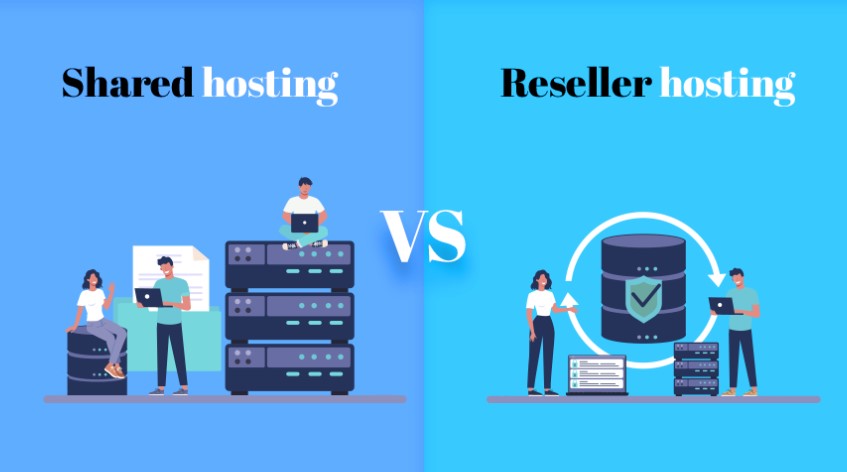Difference between Shared hosting and Reseller, before difference we can discuss briefly about shared hosting and reseller hosting.
Table of Contents
Shared Hosting
The original web hosting provider offers several accounts on a single server. A server is a dedicated PC that hosts websites and connects to the World Wide Web. A dedicated hosting service is an inverse – one machine, one website. Shared hosting providers allow one device to serve several websites. This makes practical sense because disc space is inexpensive and websites on a regular shared server plan will only run a WordPress blog anyhow.

A shared host plan is like renting an apartment in a bigger building with other residents, with each of you paying a portion of the rent.
This hosting option provides website hosting solutions that allow multiple websites to share a single server. It is best suited for small websites and/or blogs that do not need high bandwidth or advanced configuration. Moreover, all the resources are divided among customers on the server, such as RAM, CPU, and mail server.
It’s possible to host unlimited domains on your shared plan by simply adding domains to the “Addon Domains” section of the cPanel.
Advantages of Shared Hosting
- The cPanel is User-Friendly
- Ability to Host Multiple Domains
- It’s Cost Efficient
- It’s Convenience
Features of Shared Hosting:
- Shared hosting is affordable since the cost is distributed among multiple users sharing the server.
- Hosting providers handle server maintenance, security, and technical aspects, requiring minimal technical expertise from users.
- The server’s resources like CPU, RAM, and disk space are shared among multiple websites, impacting performance based on the shared usage.
- Users have restricted control over server settings and configurations due to the shared environment.
Pros of Shared Hosting:
- Ideal for small websites or beginners due to its budget-friendly nature.
- Simplified setup and maintenance, making it convenient for those new to web hosting.
- Hosting providers usually offer maintenance and support services, reducing the need for technical skills.
Cons of Shared Hosting:
- Resource sharing can lead to slower performance during high-traffic periods or if a neighboring site experiences spikes in traffic.
- Restricted server access limits the ability to customize configurations or install certain software.
Reseller Hosting
Reseller hosting plans, on the other hand, allow you to play landlord. You still have to pay for server space, but like an Airbnb, you may sell pieces of it to other clients. You effectively play a tiny web host within a larger web server.
Other use case situations include start-up owners who want to establish a large number of small websites. A reseller account allows you to manage several domains, emails, WordPress, databases, and other web software installations. It provides some freedom for the growing eCommerce businessman who may want to expand into full-service web hosting. Many web hosts began with a single machine that they parceled out to clients for web space in the 1990s and worked their way up from there.

This form of web hosting allows an account owner to use their designated RAM and bandwidth to host third-party websites. Basically, they buy wholesale hosting services then divides them into smaller plans which they sell to individuals.
Reseller web hosting plans gives account owners the ability to use their cPanel to create and manage multiple cPanel hosting accounts. This is for instance great if you are selling web hosting to your clients and friends. They can do so by using Web Host Manager (WHM). Each account will get its own resources including a personal username/password. This hosting solution works well for website developers or individuals wishing to resell web hosting. There are several reseller plans to choose from. Depending on the one you select you can add up to 250 private cPanel accounts. Therefore MonsterHost.com is giving the best cpanel hosting reseller program you can think of.
Advantages of reseller hosting
- It is a simple way to earn a reasonable income without the stress of server management. You just need to find the best reseller web hosting provider to assist you in setting up your business.
- You have no overhead, the package itself includes all the cost for the maintenance of the server. Should something go wrong on the server, the webhost provider will pay for damages.
- You have the flexibility to modify the themes and user-interface of your client’s control panel.
- You do not have to be technically savvy as the web host provider manages all the technical features. To top it off this does not cost you extra.
Features of Reseller Hosting
- Resellers can customize and brand the hosting service under their own name, logo, and pricing structure.
- Resellers can allocate server resources like disk space, bandwidth, and domains to their clients.
- Resellers often receive tools and interfaces to manage client accounts, create packages, and set pricing.
Pros of Reseller Hosting:
- Enables entrepreneurs to create a hosting business without the infrastructure investment, generating additional income.
- Resellers have control over their hosting packages, allowing customization according to client needs.
- Starting a hosting business becomes more accessible with lower initial investments.
Cons of Reseller Hosting:
- Resellers often rely on the hosting provider for server maintenance, which can affect service quality.
- Mismanagement of resources or overselling can lead to performance issues for clients.
Difference between Shared hosting and Reseller Hosting (Shared vs Reseller Hosting)
| Shared Hosting | Reseller Hosting | |
|---|---|---|
| Number of Websites and Control Panels | Shared hosting solutions enable users to manage multiple websites, but they must be managed under a single administration dashboard, typically using just one cPanel login. It makes shared hosting suitable for individuals or small businesses with only a few websites to manage. | Reseller hosting, on the other hand, is designed for managing multiple websites with separate control panels for each client. This feature is ideal for web developers, designers, or entrepreneurs who need to manage their clients’ websites independently and provide them with individual access to their respective control panels. |
| Hosting Performance | In shared hosting, the performance of your website can be affected by the resource usage of other websites on the same server, as all users share the server’s resources. This could result in slower loading times or even downtime during peak usage periods. | Reseller hosting, however, generally offers better performance, as it often allocates more resources to each account and provides greater control over server configurations. This allows resellers to optimize performance based on their clients’ needs, resulting in improved loading speeds and overall website performance. |
| Security Differences | Shared hosting plans generally offer a standard set of security tools and features, such as two-factor authentication for admin dashboard access, DDoS protection, and SSL certificates included with most platforms. | Reseller hosting packages often come with more robust security offerings, including daily data backups for all sites under your management, regular security scans provided by the hosting platform, and advanced web application firewall options. |
| Technical Expertise | With shared hosting, limited technical expertise is required. The hosting provider manages server maintenance, security, and software updates, allowing users to focus on their website content and design. Shared hosting is an excellent option for beginners, small businesses, or those with basic website needs. | Reseller hosting requires a higher level of technical expertise. As a reseller, you’ll be responsible for managing multiple clients and their individual hosting accounts. This involves setting up and maintaining hosting plans, providing customer support, handling billing. Reseller hosting is best suited for web developers, designers, or those looking to start their own web hosting business. |
| Target Audience | Shared hosting is ideal for beginners, small businesses, and personal websites that do not require extensive customization or high resource allocations. | Reseller hosting is suitable for web developers, designers, and entrepreneurs looking to start a web hosting business or provide hosting services to their clients alongside their primary services. |
| Control and Customization | With shared hosting, you have limited control over server configuration and may face restrictions on software and applications.This can be a disadvantage if you require more customization or need to install specific software for your website. | Reseller hosting provides increased control over server settings and customization. As a reseller, you can offer tailored solutions to your clients, catering to their unique needs and preferences. |
| Scalability and Flexibility | Scalability can be limited with shared hosting due to the shared resources. If your website experiences rapid growth or requires more resources, you may need to upgrade to a more powerful hosting plan, such as a VPS or dedicated hosting. Migrating to a new hosting plan can be time-consuming and complicated | Reseller hosting offers more scalability because you can create customized hosting plans for your clients. As your clients’ websites grow, you can easily adjust their hosting plans to accommodate their needs. This flexibility makes reseller hosting an attractive option for businesses that expect growth or have fluctuating resource requirements. |
| Budget and Cost | One of the primary advantages of shared hosting is its affordability. Since resources are shared among multiple users, the cost per user is lower. This makes shared hosting an ideal choice for startups or small businesses with limited budgets. | Reseller hosting plans are generally more expensive than shared hosting plans. However, the potential to generate income by reselling hosting services to clients can offset the cost. Keep in mind that managing a reseller hosting business also requires an investment in time and effort |



